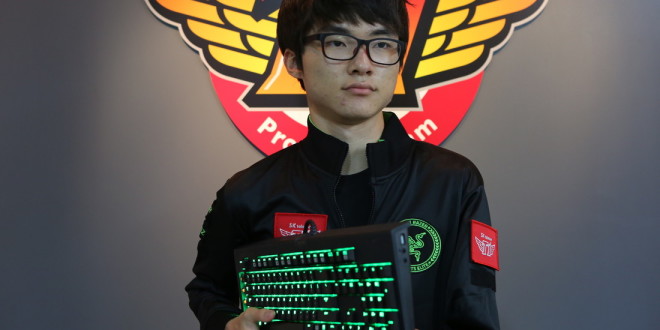
Image credit: Guttenfelder / AP.
In March, we reported that Southeast Asia is starting to moving away from ecommerce to other verticals like fintech. There’s one category that escapes the chart, probably due to its uniqueness: sports.
But it doesn’t mean it’s any less lucrative. Asia-Pacific’s total sports industry revenue was expected to reach US$27.5 billion in 2015. It’s a significant market that generates media and sponsor attention, apparel sales, and demand for sports science and analytics.
Sports startups can be more diverse than people realize, with opportunities from coaching tech to esports analytics – even in Asia. These ideas are driving the sports tech industry and could be the answer to improving sports performance around the world.
leAD Sports Accelerator, the new program founded by grandchildren of Adidas-founder Adi Dassler that concentrates on early stage startups in the sports sector, values not only the European and North American market but is also looking for interesting Asian sports startups to invest in. The Berlin-based accelerator says it can add value not only to startups that want to accelerate their expansion, but also those expanding to Europe.
Train like a beast, analyze like a statistician
“Training is a science that is constantly discovering new insights and trends that influence the way we train,” says Fee Beyer, a sports-tech expert and coach from Berlin.
A regional-level swimmer till the 90s, Fee coaches athletes and mentors sports startups globally. Now, she’s one of the mentors working with the leAD Sports Accelerator, which aims to connect sports startups with mentors and founders from the industry. Fee, along with many other mentors, is working on turning these new insights and trends into reality, and has spent a lot of time thinking about how technology can boost an athlete’s performance.
For example, Fee observes that professional sports clubs are also now open to using and testing technologies to minimize injuries and maximize performance. She’s currently studying head strength and conditioning coaches for German soccer league clubs. She says she sees a strong implementation of GPS and heart rate tracking devices, smart scales, and data evaluation tools in the study. She thinks there’s potential in active wear, nutritional analysis, analyzers of body composition, and especially, implantable sensors.
“With a sensor attached to your bloodstream 24/7, injury prediction, and super-individualized training and nutrition plans will become the new standard,” Fee says.
More than marketing gimmicks
The science that Fee talks about is not just used in Europe or soccer. Tech in basketball has moved beyond marketing gimmicks like shoe aesthetics to actually improving athleticism. Stephen Curry, touted the best basketball shooter in history, wears goggles
to force him to practice without perfect information. Kobe Bryant uses a smart basketball court that tracks and visualizes motion with LEDs.
In football (and other sports), there are multiple possibilities for wearable tech. These can range from strength bands for weights fanatics, vertical leap height calculators, footwear that can measure an athlete’s fatigue level, and even socks that can sense runners’ landing techniques and cadence.
Disruption is also heading to the brain – when certain regions in the brain are stimulated, performance may be improved. Headphones that stimulate the motor cortex to improve physical training are used not just by athletes, but also by Navy Seals.
“Mental strength is often the critical factor for winning, so we will see more technologies covering neurocoaching methods,” Fee says.
There are also growing possibilities in the healthcare realm within Asia. Asia-Pacific is expected to grow in the sports medicine industry to reach US$9.3 billion due to the increasing occurrence of sports injuries in countries like China, India, South Korea, and Southeast Asia. Knee injuries and age-related problems like rheumatoid arthritis are also common.
Article continues below.
If you have an idea that combines sports and technology in an innovative way, leAD Sports Accelerator is an opportunity to grow your businesses. The accelerator is an initiative that has a long and rich history with ties to sportswear legend Adi Dassler’s grandsons: Klaus, Horst and Stefan Bente.
The Berlin-based accelerator will connect sports startups and founders-to-be with outstanding mentors and investors in the sports business. It will take place from September 12th to December 8th, 2017. Learn more here.
Continued
Getting friendly with fans
On top of helping athletes achieve more, data can also take relationships with fans a step further. With cloud platforms, sports analysts can build profiles of fan segments, tracking their media consumption, social media activity, and offline purchases. This allows them to develop personalized marketing for fans and, possibly, drive revenue. Real Madrid is working with Microsoft to create individual fan profiles using data it collects. This can then be used to create personalized QR discount codes or messages.

Baseball is a spectacle in Asian countries. Pictured here is a baseball game in Korea with cheerleaders. Image credit: Touch Daegu.
While North America and Europe have comparatively stronger sports brand names, East Asia has also demonstrated the potential for extreme fan culture, especially in sports like baseball. Japan, Korea, and Taiwan consider baseball their “national pastime”, and fans display strong ethnocentric tendencies. Spectacles like professional cheerleading are created to drum up excitement in the stadium. A new tournament has been announced for these three countries.
Moreover, female interest in sports is more evident in Asia, according to Nielsen. In the United Arab Emirates (UAE), India, and Indonesia, more than half of all women consume sports, especially on TV. Japanese women also show above average interest in sports. And the UAE and India are among the countries with the smallest gender gap for interest in sports.
It should be no surprise that social engagement and prediction apps are getting funded in Asia. Fan engagement app Rooter has raised funding. Besides cricket, the predominant sport in India, the Mumbai-based startup also engages enthusiasts of football, tennis, and basketball. F1 racing is in the works. Singapore-based sports prediction social network SportsHero has raised US$2.5 million on the Australian Securities Exchange in February this year.
Gaming as a sport
Some may scoff that esports aren’t sports, but that’s not true. Esports also have elements of competition, strategy, performance under pressure, spectators, and a strict set of rules. Indeed, Nielsen found a “crossover effect” – compared to the general population, an NBA fan is 114 percent more likely to also be an esports fan.
Sportswear legend Adi Dassler would have supported esports, says Horst Bente, his grandson and the director and co-founder of leAD Sports Accelerator. That’s why esports is one of the verticals of sports that the accelerator will cover, along with performance, venues, entertainment, fans, new sports, teams, and active lifestyle. The Berlin-based accelerator plans to provide startups 12 weeks of high-intensity training including stress-testing business cases, enhancing legal set ups, and improving leadership and pitching skills. The accelerator enjoys an extensive sports industry and experts network ranging from coaches to sports marketing to business management. And it’s not surprising that they’re welcoming Asian sports tech startups to their fold.
“Adi Dassler was passionate about sports above all. He was always looking for innovation and wanted to help athletes by improving their equipment. So we think he would be supporting all the fields connected to innovation – including esports – and helping athletes,” Horst says in an interview with Esports Insider.

Lee “Faker” Sang-hyeok is the Mid Laner for SK Telecom T1, the dominating champions in League of Legends Worlds. He’s all decked out in Razer gear. Image credit: GES
Firms like Razer want to shake things up. They’ve launched the Razer Synapse, a software that tracks players’ gameplay. Players can analyze their in-game movement through heat maps, clicks they make, and keyboard button presses. Fat-fingered or slacking teammates can be booted. This is similar to sensors in player jerseys in physical sports that track their movement and stats. Like sports apparel brands, Razer sponsors 14 sports teams in total, out of which 6 are Asian.
It’s an exciting time for sports startups. After all, they embody the spirit of tech, allowing both human and algorithm to get faster, better, and stronger.
This post The rising sports tech industry in Asia is attracting international interest appeared first on Tech in Asia.
from Tech in Asia https://www.techinasia.com/sports-tech-in-asia
via IFTTT

No comments:
Post a Comment